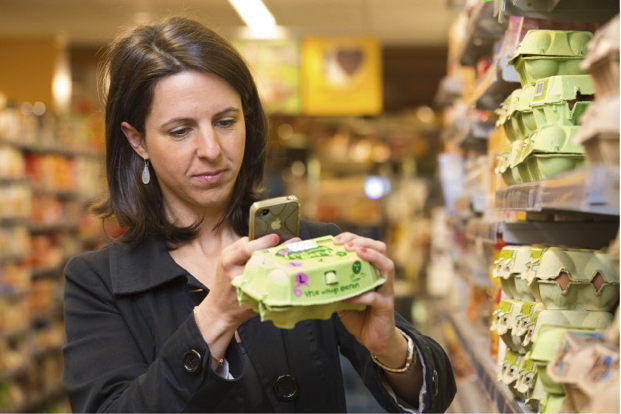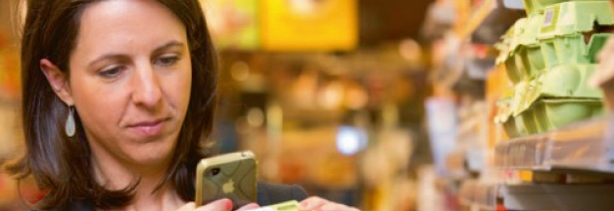Interview: Rob Voster
Questionmark, based in Amsterdam, provides a service that uses the smartphone and the internet to give the consumer direct access to clear sustainability characteristics of food products. Compact talked to Questionmark’s managing director, Mrs. Charlotte Linnebank, to discover how this innovative concept was developed and what it can offer shoppers and producers alike.
A pivotal moment in the young history of sustainability was the publication in 1962 of Rachel Carson’s book Silent Spring. Rachel Carson wrote the book against the background of DDT usage, an insecticide which prevented diseases such as malaria being spread by mosquitoes. Without doubt DDT saved numerous lives during the 1940s, 1950s and 1960s. However, the medium and long-term effects of DDT on the environment were and continue to be devastating. In Silent Spring Rachel Carson used the medium of a book to collect and disseminate information on chemicals such as DDT in order to share the ecological impact of such agents with the public at large. One of the direct consequences of the book’s publication was a US congressional investigation into the usage of pesticides and a consequent reduction in the world-wide usage of DDT despite its obvious short-term health benefits.
In today’s world sustainability has become a buzz world. However, its definition and the link to food products is often confusing and complicated. When shopping in an average supermarket the consumer is not only confronted by the variety of products but also by individual product names and labeling describing various product attributes such as the ingredients, warnings and sometimes sustainability characteristics. Although labeling is supposed to be clear, easy to read, easy to understand and not misleading, this is often not the case.
Questionmark is a service that uses the smartphone medium and the internet to provide the consumer with direct access to clear sustainability characteristics of food products. Compact has visited Questionmark, based in Amsterdam, and has interviewed its managing director, Mrs. Charlotte Linnebank, to discover how this innovative concept was developed and what it can offer today’s shoppers and producers alike.
Mrs. Linnebank, please share with us how and why Questionmark came about?
The idea behind Questionmark started in 2012, when a group of people looked at the overall, end-to-end production and supply chain of food products. They focused in particular on the sustainability imbalances regarding the impact on nature, animal welfare, human rights and child labor. Their conclusion was that due to many issues information about sustainability criteria was often hard to get at or simply not made accessible at all. There was an enormous gap between what data was available at the production level and the information made available to the consumer. It was a clear example of failure by the producers to inform their end-users, the consumers. The objective of Questionmark is to close this gap and influence supply and demand by providing clear, easy to understand and truthful sustainability information. The Questionmark app was launched in April 2014 and was supported financially by a donation from the Dutch “Postcode Lottery”.
What information resources are used by Questionmark and how does Questionmark ensure its very necessary independence?
Amongst others Questionmark uses two important databases: the social hotspot database (SHDB) (see www.socialhotspot.org) and the Ecoinvent database (www.ecoinvent.org). SHDB allows us to model supply chains by country-specific sectors, calculate labor intensity and report on the proportion of worker hours at risk due to social impacts and as such provide transparency into social conditions worldwide. Ecoinvent information provides data to assess the carbon footprint, water footprint, monitor overall environmental performance and product design.
Questionmark itself is a non-political organization and we attach great importance to our independence. Both database providers are not-for-profit associations and have established themselves as leaders for creating independent, transparent life cycle inventory information.
In addition to the above databases Questionmark gathers information from product labeling and product manufacturers directly. Questionmark validates this information for accuracy and completeness.
How is sustainability at Questionmark measured, in other words what does the sustainability scoring methodology of Questionmark look like?
Every product we evaluate is given an overall, aggregated sustainability score based on the following four criteria: public health, environment, human rights and animal welfare. Public health looks at a product’s risk profile in terms of harmful substances, antibiotics, resistant bacteria, food poisoning and food infections. The environment theme assesses the impact the production chain has in respect of climate change, biodiversity and water consumption. The product’s risk profile in terms of discrimination, child labor and/or living wages is addressed by the human rights factor. And finally, animal welfare is measured by determining the conditions in any of the husbandry systems that form part of the supply chain.
We calculate an end score per product based on all four theme scores and by weighting the theme scores using both a personal weighting set by the Questionmark user as well as weighting failed scores. The latter weighting method allows us to weight a low theme score more heavily than a high theme score. In this manner we can summarize the assessment of each product into a single score, while still expressing possible big problems in the chain. The final end score is a number between 0 and 10.
The Questionmark scoring methodology is based on international standards and is continuously discussed in multiple stakeholder dialogues. However, any decisions made to further develop or adapt the methodology are made by Questionmark only. This means that our contributors and other stakeholders cannot influence the product scores in any way. We do closely monitor developments by industry and research by academia to further enhance and improve our methodology when required but we value our independence.
Can Questionmark provide scores for every available product in Dutch supermarkets. What choices were made to decide which products to include and what is the role IT played in this?
Currently, Questionmark provides information on about 40.000+ products. The product categories included are meat, meat substitutes, dairy products, desserts, ice, chocolate, beer, soft drinks, juices, fruit, vegetables and potatoes. Coming soon are: coffee, tea, fish, soups and sauces. Both ‘A-brands’, store brands and discount brands of approximately 20 different shops and supermarkets chains are included in the Questionmark database.
Every food product sold within the Netherlands is assigned a unique barcode to identify it. We selected the products to be included based on consumer interests and availability. Initially, we gathered the product attributes in a similar way to Google street view, i.e. by asking Questionmark permanent and temporary staff to enter shops and supermarkets and photograph individual products and product labels, registering their attributes, followed by a process of digitalization. Lately, we have automated the process and gather the majority of information directly from either the manufacturer or supermarket. Since the beginning we continually emphasized accurateness and completeness of the information gathered per product in order to guarantee a high quality service.

What will the future bring for Questionmark?
There are over 300.000 users (October 2015) of the Questionmark app and Internet website. The users do not just use Questionmark to look at the sustainability score of those products present in the existing database but also expand this database by registering their own products, setting their own weights, adding new attributes, sharing new information in the form of comments, photos, video. In the near future we will enable the possibility for users to ask food producers specific questions. As such Questionmark is building up a data store that integrates data about individual products, product sets, (store) locations and date/time of inquiry. This information will be used to facilitate new functionalities. One of the new features for consumers is the shopping list, which allows users to define a list of products and select the product with the best sustainability score. Furthermore, Questionmark will offer companies the opportunity to submit their specific supply chain data, enabling them to differentiate their products in our rankings and have their story told and confirmed to the public by an independent party.
A new development is in the business-to- business domain. We have established a new company called Q.M. Intelligence, which targets third-party companies such as producers, supermarkets and brand owners. By providing selected data about the sustainability improvement opportunities for each ingredient in their products, market information and consumer insights we believe that companies will become more transparent and develop/optimize sustainable supply chains.
Mrs. Linnebank, has Questionmark changed your own shopping behavior and if so, how?
As for other Questionmark users, I now have more insight into the choice of products available for me to buy, their sustainability characteristics and where to buy them. Because of this awareness I now look more closely at a product’s country of origin and shop in multiple supermarkets to buy the right product.
Charlotte Linnebank is managing director of Questionmark since 2012. Her previous positions included Senior Manager at KPMG Sustainability and Head of Business and Industry at the World Wide Fund for Nature (WWF).
Charlotte Linnebank studied at the Vrije Universiteit Amsterdam, Hogeschool Amsterdam and Rotterdam School of Management, Erasmus University.



